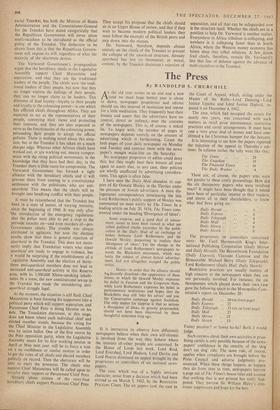The Press
By RANDOLPH S. CHURCHILL
A s the old year comes to an end and a new
(and we must hope better) year is about to dawn, newspaper proprietors and editors should use this interval of recreation and repose for a little meditation. They frequently beat their breasts and assert that the advertisers have no control, direct or indirect, over the contents of the newspapers. This is, of course, a naked lie. To begin with, the number of pages in newspapers depends entirely on the amount of advertising which is forthcoming. Count the lush pages of your daily newspaper on Monday and Tuesday and contrast them with the news- paper's meagre waist-line on the Saturday.
No newspaper proprietor or editor could deny this; but they might beat their breasts all over again to assert that, in any case, their policies are wholly unaffected by advertising considera- tions. This again is often false.
I have seen the Daily Mail abandon its sup- port of Sir Oswald Mosley in the Thirties under the pressure of Jewish advertisers. A most dis- ingenuous correspondence terminating the late Lord Rothermere's public support of Mosley was commented on most wittily by The Times. In a leading article on July 20, 1934, The Times com- mented under the heading 'Divergence of Ideas': Some surprise, and a good deal of amuse- ment, seems to have been caused in what are called political circles yesterday by the publi- cation in the Daily Mail of an exchange of letters between Lord Rothermere and Sir Oswald Mosley, purporting to explain their 'divergence of ideas.' Yet the change in the attitude of Lord Rothermere's newspapers to- wards the Blackshirt movement, which was lately the subject of almost lyrical advertise- ment, had not altogether escaped the public notice. . . .
. . . Hence—in order that the alliance should be, decently dissolved—the appearance of these letters, in which Sir Oswald Mosley expresses his belief in Fascism and the Corporate State, while Lord Rothermere expresses his belief in parliamentary institutions and hopes that the Blackshirts may still 'take his advice' and join the Conservative campaign against Socialism. The only matter for surprise is that so serious a divergence of ideas, so gravely propounded, should not have been discovered by these thoughtful statesmen long ago.
It is instructive to observe how differently newspapers behave when their own self-interest is involved from the way they behave where the interests °bother people are concerned. In the House of Lords last week, Lord Reid, Lord Evershed, Lord Hodson, Lord Devlin and Lord Pearce dismissed an appeal brought by the proprietors or controllers of six national news- papers.
The case, which was of a highly intricate character, arose from a decision which had been arrived at on March 5, 1962, by the Restrictive Practices Court. The six papers took the case to the Court of Appeal, which, sitting under the Master of the Rolls—Lord Denning—Lord Juitice Upjohn and Lord Justice Diplock, re- jected it on December 4, 1962.
The case, which had occupied the courts for nearly two years, was concerned with such matters as retail price maintenance, restrictive practices and cartel arrangements. It must have cost a very great deal of money and have con- stituted a fat Christmas hamper for the lawyers.
It is interesting to see how the papers reported the rejection of the appeal in Thursday's edi- tions. In column inches the tally went like this:
The Times .. .. 24 The Guardian .. 19 The Financial Times .. 16 The Daily Worker .. 4 These are, of course, the papers who were not parties to these costly proceedings. How did the six threepenny papers who were involved react? It might have been thought that it would have been of particular interest to their readers, and above all to their shareholders, to know what had been going on: Daily Herald .. .. 9 Daily Express 6• Daily Telegraph . 4
Daily Mail .. . 4
Daily Mirror .. 0 Daily Sketch .. .. 0 The proprietors or controllers concerned were: Mr. Cecil Harmsworth King's Inter- national Publishing Corporation (Daily Mirror and Daily Herald); The Beaverbrook Foundation (Daily Express); Viscount Camrose and the Honourable Michael Berry (Daily Telegraph); Lord Rothermere (Daily Mail, Daily Sketch).
Restrictive practices are usually matters of high concern to the newspapers when they are not personally involved. For instance, the six threepennies which played down their own case gave the following space to the Monopolies Com- mission's report on December 20:
Daily Herald .. 10 (on front page) Daily Express .. 22 Daily Telegraph .. 33 (six on front page) Daily Mail .. 25 Daily Mirror .. 25 Daily Sketch .. 13
Funny peculiar? or funny ha-ha? Both. I would judge.
Such coyness about their own activities in price- fixing cartels is only possible because of the news- papers' confidence in the sanctity of the 'dog don't eat dog' rule. The same rule, of course, applies when complaints are brought before the Press Council and adverse judgments pro- nounced. When these things happen, as happen they do from time to time, newspapers borrow a page out of The Times's house rules and assume that nothing that is not printed has really hap- pened. They borrow Sir William Haley's elec- tronic suppressors and pope for the best.






























 Previous page
Previous page